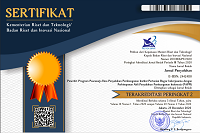Manajemen Sumberdaya Keluarga Peserta Program Pemberdayaan Masyarakat di Kabupaten Bogor
Abstract
Nowdays it is difficult for many families to achieve an ideal life, this situation cause, formulation managing human resource which has a good quality is not optimal. The important thing must be carried out to make the families maintain their life is to manage the limited resource by the family resource management. This research analyzed the family resource management of participant in empowerment program and the factors that influenced them. The research design was crossectional study using survey method to collect data from 300 respondents. The result showed that highest percentage of respondent carried out the family resource management categorized as bad. There was a significant difference between the family resource management at Dramaga District and Leuwisadeng District or Pamijahan District (α<0.05). The factors which significantly influence the family resource management are income per capita, the family communication quality, the occupation status of spouse and the participation in extension program.
Keywords: family resource management, community empowerment, income per capita, extension program, communication quality
Downloads
Authors who publish with this journal agree to the following terms:
- Authors retain copyright and grant the journal right of first publication with the work simultaneously licensed under a

This work is licensed under a Creative Commons Attribution 4.0 International License that allows others to share the work with an acknowledgement of the work's authorship and initial publication in this journal. - Authors are able to enter into separate, additional contractual arrangements for the non-exclusive distribution of the journal's published version of the work (e.g., post it to an institutional repository or publish it in a book), with an acknowledgement of its initial publication in this journal.
- Authors are permitted and encouraged to post their work online (e.g., in institutional repositories or on their website) prior to and during the submission process, as it can lead to productive exchanges, as well as earlier and greater citation of published work (See The Effect of Open Access).















